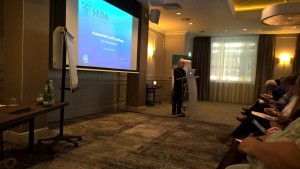Keynote Assessment and feedback – why do we bother? Ian Pirie University of Edinburgh
The conference topic innovations in assessment was clearly a popular choice despite there having been a lot of dissemination of assessment developments over the last decade. It seems that whilst there has been many advances in this area there is still evidence that practice could be further enhanced. The conference provided an opportunity to hear about practice across the sector and how developments can further enhance practice.
The conference opened with a great keynote from Ian. He outlined the background with reference to the good practice across the sector but the NSS still shows that there are issues.
Assessment needs to be integrated into learning as part of pedagogy and not just added on to the end of modules and programmes but making changes is difficult. Today’s students do need different assessments as the world is rapidly changing and the students need skills that will help them gain employment within this world. Students have different skills now and have access to information that is readily available through the internet. They do not need to have lectures that just provide information as they can gain this elsewhere but they do need to be engaged in active learning that challenges and develops them. Employers today expect one in two graduates to become tomorrow’s leaders and so there is often a mismatch between what we do when preparing them for the world of work. Students like to have personalised academic guidance, advice and support, clarity of expectations, an academic community and 24/7 access to services.
We need to teach students to be more creative and innovative and so assessment needs to focus on this too. The design needs to assess not just the work but their development as a person. The design is therefore critical to this. Assessment is an academic judgement but one that must be based on clarity of what is being assessed and explicit criteria that students understand. One approach to ensuring this is to engage students in re-writing the learning outcomes so that students have these in a language they understand. In terms of feedback this should help students make improvements but this means they cannot be passive recipients of this. We have to help students take responsibility for their learning and engage with the feedback.
